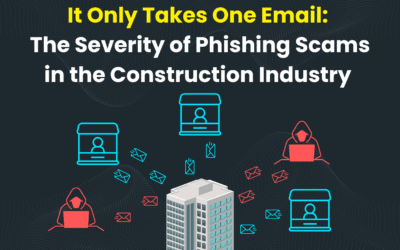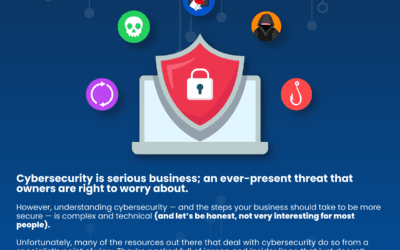In today’s digital age, construction and trades are increasingly reliant on technology. While this brings numerous benefits, it also exposes businesses to potential cyber threats. Protecting your business with robust IT security measures is crucial. Here are some steps you can implement today to massively enhance your business’s cybersecurity.
1. Implement Strong Password Policies
Weak passwords are a leading cause of security breaches. By ensuring strong passwords, you make it significantly harder for cybercriminals to gain unauthorized access.
Create Complex Passwords: Ensure all passwords are at least 12 characters long and include a mix of letters, numbers, and symbols.
Use a Password Manager: Tools like Keeper or 1Password help generate and store complex passwords securely.
Regular Updates: Set a policy for changing passwords every 90 days.
2. Enable Multi-Factor Authentication (MFA)
MFA adds an extra layer of security by requiring a second form of verification in addition to passwords. This can be a code texted to you every time you login or an authentication app that you reference when logging in.
Set Up MFA: Enable MFA on all important accounts and services, especially email and financial systems.
Employee Training: Ensure all employees understand how to use MFA and its importance.
3. Regularly Update Software and Systems
Outdated software can have vulnerabilities that cybercriminals exploit. Using old hardware that is not compatible with newer updates will also have the same issue, but you may not be aware since it is technically “Up To Date”.
Automatic Updates: Enable automatic updates on all devices and software whenever possible.
Routine Checks: Conduct regular checks to ensure all systems are up-to-date.
4. Use Reliable Antivirus and Anti-Malware Software
These programs help detect and prevent malicious software from compromising your systems. These programs do have access to a large portion of your systems though, so make sure you are using a trusted brand that will not hard your security.
Choose Reputable Software: Invest in high-quality antivirus and anti-malware programs.
Scheduled Scans: Set up regular scans to detect and remove threats.
Real-Time Protection: Ensure your software provides real-time protection against threats.
5. Educate Your Employees
Human error is a major factor in many security breaches. Educated employees are your first line of defense. Make sure your employees know when something doesn’t look right and have clear steps for them to document and report the incident so that it doesn’t fly under the radar.
Training Programs: Implement regular cybersecurity training sessions.
Phishing Awareness: Teach employees how to recognize and avoid phishing attempts.
Clear Policies: Develop and distribute clear IT policies and procedures.
6. Regular Data Backups
Backups ensure that you can recover your data in case of a breach or hardware failure. The second most common attack is a ransomware attack, which locks all of your data and requires you to pay a sum of money in order to get your information back. This can be everything from tax documents, business licenses, customer data, and any other information stored on your devices. Data backups prevent having to pay the attacker and allows you to get back to work faster.
Automated Backups: Set up automated backups for all critical data.
Offsite Storage: Use cloud storage solutions or offsite backups to protect against physical damage.
Test Restorations: Regularly test your backup systems to ensure data can be restored effectively.
7. Secure Your Wi-Fi Networks
Unsecured Wi-Fi networks can be an easy entry point for cybercriminals. They are able to intercept unprotected information without you ever knowing they have done it. Making sure to secure your network is also important for any kind of payment processor since you are handling customer payment information and will be held liable if the customers information becomes compromised.
Action Steps:
Strong Encryption: Use WPA3 encryption for your Wi-Fi networks.
Separate Networks: Create a separate network for guest access to prevent unauthorized access to your main business network.
Regular Audits: Conduct regular audits of your network security settings.
Implementing these basic IT security measures can significantly protect your home service business from cyber threats. By taking these actionable steps, you ensure your company is better equipped to handle potential security challenges.



